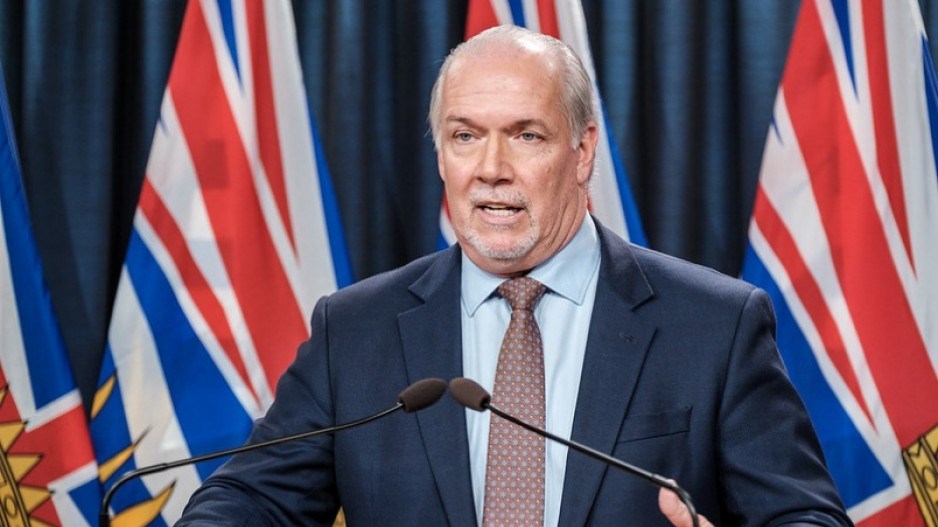The premier British Columbians say they’d like to have a beer with will now get his choice of drinking companions without worryingly looking at his watch to get back to work.
John Horgan’s resignation Tuesday was only sudden in that so many knew it was happening, and were indeed organizing to succeed him, that he had to pronounce definitively on his presence.
He spent the weekend with his caucus and wider team plotting priorities for the onramp to the next election, presumed when he was leader but not necessarily now to be in 2024, then was pretty much boxed in to come clean about his future. Another six years for him likely feels like an eternity in which two cancer bouts correctly would make you value the time you have and be wise enough to know the time ahead is not infinite.
No one, but no one, can blame Horgan for going: 36 years in public service, 17 as an MLA, eight as party leader, five as premier. The first two-term NDP premier, reluctant to run the party at first, is also the first never to leave in scandal.
He didn’t have to fix the economy, but he didn’t break it, either. He inherited a nation-leading set of public finances and didn’t squander them, even if he didn’t particularly build upon them with initiatives that sought to disincentivize wealth with a disinterest in growth.
He kept the province from falling to pieces in the pandemic, even if there is fractiousness in how restrictions were imposed, lifted, reimposed and relifted. He said he followed science, which is true in that science follows the latest version of its truth, but for many businesses and citizens that has been difficult to digest.
He spent a lot of effort trying to keep the TransMountain pipeline from completion but was a cheerleader for the massive liquefied natural gas project and a rationalizer for the massive Site C hydroelectric initiative. Governing is anything but ideologically consistent or coherent, as he showed.
He traded on his currency at times, especially with environmentalists but surprisingly with teachers, and learned with his now-scuttled $789-million plan for a new Royal Museum that timing is everything in his profession.
He benefited in that his affability meant few wrote critically of him, but even if he hated something you wrote he would keep the conversation running. His hardening of freedom-of-information law was a much larger setback for the public right to know than any coziness or dissidence with the press corps, besides.
He is a bit like Shopify stock at the end of last year, performing so well that you know it can’t last. It’s certainly a lesson he learned: cash out before your political situation plummets. It’s apparent his personal stock would only decline now because the era of near-free borrowing and near-zero inflation is done and the era of too many patients and too few doctors is upon us.
The games now begin: a leadership contest by the fall, possibly an election much sooner than 2024, the legislated date already rendered meaningless by that last election whim in 2020.
The main contestants will be two key ministers already with supporters eager to form their teams. David Eby was ready to jump into the job in 2017 when it appeared the NDP might not win the election, and he is no less ready to try now as attorney general and housing minister. Ravi Kahlon was politically unknown in 2017 but has taken on prominence as the province’s jobs, economic recovery and innovation minister.
Neither, however, has a lot to show for their large portfolios. Eby’s determination to bury the 小蓝视频 Liberals through a money laundering commission of inquiry never materialized, and his housing efforts have mainly been in taxing owners and threatening cities with imposing construction. Kahlon’s Stronger小蓝视频 plan is just that: a plan, with no budget and therefore no authority.
There will be others from cabinet and caucus, but no one from outside that circle appears to have the capacity to command a leadership bid in the short timeline. The question will then be whether a new leader will use whatever campaign momentum builds – and sometimes it doesn’t – to seek a mandate from voters, more than just the party.
Whoever wins will have to know, though, that the most significant factor in the way of a resumption of power by the 小蓝视频 Liberals – or whatever Kevin Falcon will decide to call them –won’t any longer be across the aisle or on the debating stage. It would be hubris for any Horgan successor to believe those shoes can simply be filled and worn.
Kirk LaPointe is publisher and editor-in-chief of Business in Vancouver and vice-president, editorial, of Glacier Media.




